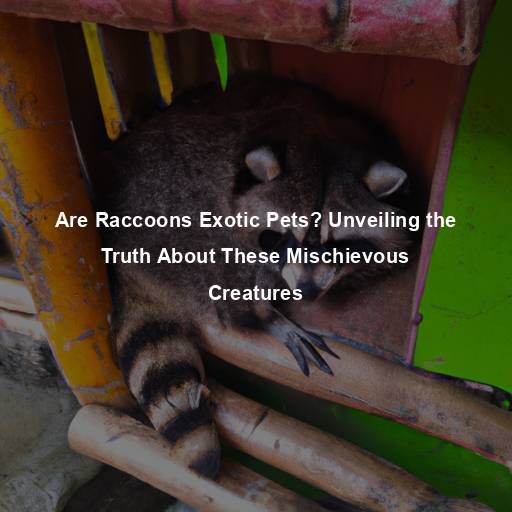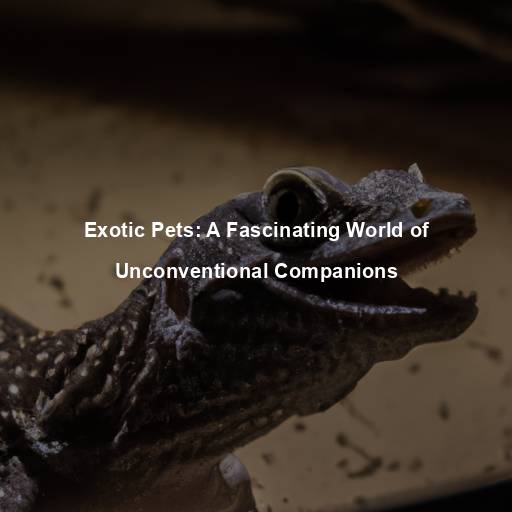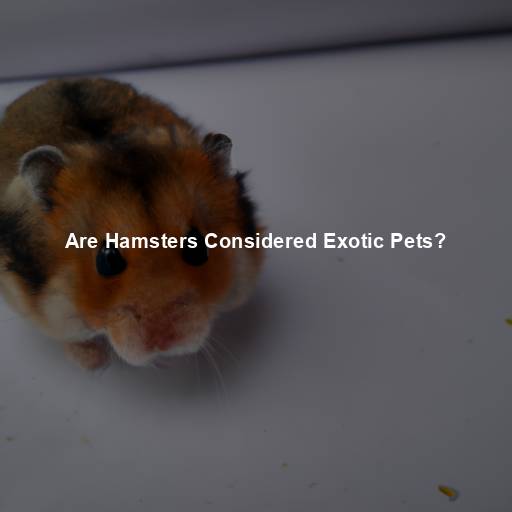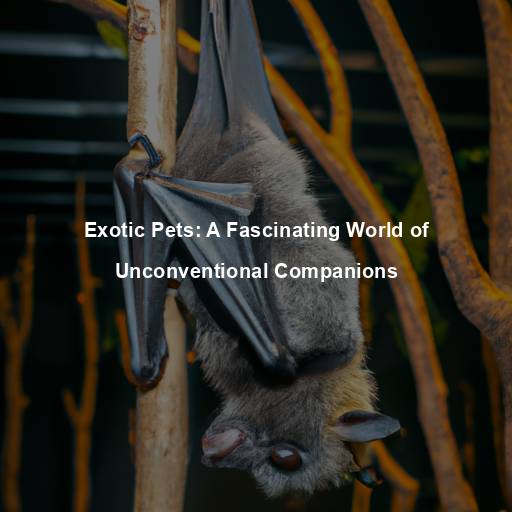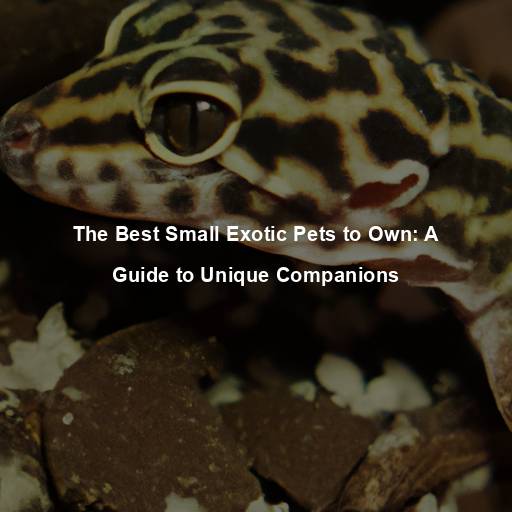Are Raccoons Exotic Pets? Unveiling the Truth About These Mischievous Creatures
Last Updated on November 15, 2023 by Evan
Contents [hide]
- 1 Understanding Exotic Pets
- 2 Unveiling the Truth
- 3 The Controversy Surrounding Raccoon Ownership
- 4 Responsible Alternatives for Raccoon Enthusiasts
- 5 The Importance of Conservation
- 6 The Fascination with Raccoons in Popular Culture
- 7 The Reality of Raccoons as Wild Animals
- 8 Final Thoughts: Embracing the Enigma of Raccoons
- 9 FAQs – Are Raccoons Exotic Pets?
- 9.1 What is an exotic pet?
- 9.2 Can I legally keep a raccoon as a pet?
- 9.3 Are raccoons suitable companions for domestication?
- 9.4 Are there any risks associated with keeping raccoons as pets?
- 9.5 Can raccoons be domesticated if raised from a young age?
- 9.6 What are some alternatives to keeping raccoons as pets?
Understanding Exotic Pets
Exotic pets have always fascinated pet enthusiasts with their unique characteristics and captivating allure. From colorful reptiles to rare birds, the world of exotic pets is filled with wonders that often push the boundaries of traditional pet ownership. However, amidst this diverse menagerie, there lies a creature that has gained attention for its intelligence, mischievous nature, and undeniable charm – the raccoon. But are raccoons truly suitable as exotic pets?
The Enigmatic Nature of Raccoons
In the sprawling landscapes of North America, a captivating creature roams under the cover of the night. With their enigmatic eyes framed by striking black masks and their tails adorned with captivating rings, raccoons leave a lasting impression. These intelligent beings possess a perplexing ability to navigate their surroundings with deftness and agility, adapting seamlessly to diverse environments. Their eclectic palate knows no bounds as they feast on a medley of fruits, nuts, insects, and even small mammals, showcasing their versatility in the realm of sustenance.
Legal Considerations
Before considering a raccoon as a pet, it is crucial to understand the legalities associated with owning one. The regulations regarding raccoon ownership vary widely across different countries and even within various states or provinces. In some regions, it is illegal to keep raccoons as pets due to concerns regarding public safety and the potential transmission of diseases. Therefore, it is essential to research and comply with local laws and regulations before considering a raccoon as a pet.
Raccoons and Domestication
The fascinating realm of domesticated animals never ceases to amaze us, especially when we consider one key differentiating factor: their remarkable capacity to adapt and forge profound connections in human environments. While it’s intriguing to ponder the potential domestic qualities of raccoons in captivity, it’s crucial to acknowledge their inherent wild nature. Unlike their domestic counterparts, raccoons have not undergone the extensive evolutionary journey of selective breeding that often spans multiple generations, resulting in genetic alterations specifically tailored to harmonize with our human universe. This enigmatic distinction between domestication and the raccoon’s primal essence leaves us pondering the unique allure of these creatures.
The Challenges of Raising Raccoons
Raccoons present several challenges that potential owners must consider seriously. Firstly, their intelligence and curiosity can lead to destructive behaviors. Raccoons are notorious for their ability to open doors, rummage through cabinets, and cause extensive damage to property. Furthermore, their natural instincts, such as marking territory and scavenging, can be difficult to manage within a domestic setting.
Health and Safety Concerns
When it comes to keeping raccoons as pets, the health and safety risks are no joke. These little critters may look cute and cuddly, but they can carry some serious diseases like rabies and roundworm that can be transmitted to humans and other animals. And let’s not forget about their sharp claws and teeth that can cause some pretty nasty injuries if they feel threatened. While proper care, specialized diets, and regular vet visits can help minimize these risks, it’s important to remember that there will always be some level of uncertainty when it comes to having raccoons as pets.
Ethical Considerations
When it comes to raccoons as pets, the road gets rocky and the questions pile up. Sure, it may seem fun and adorable to have a raccoon prancing around your living room, but let’s delve deeper, shall we? These critters are wild at heart and thrive in their rightful homes, playing their crucial parts in Mother Nature’s grand scheme. Snatching them away from their natural habitats for the sake of taming may tip the scales of their innate behaviors.
Alternative Ways to Appreciate Raccoons
While raccoons may not be suitable as pets, there are alternative ways to appreciate and admire these fascinating creatures. Observing raccoons in their natural habitats, visiting wildlife sanctuaries or rehabilitation centers, and supporting conservation efforts are all impactful ways to engage with raccoons responsibly. These activities allow us to appreciate their beauty, intelligence, and contribution to the natural world while respecting their need for a wild and free existence.
Unveiling the Truth
Delving into the enigmatic world of raccoons, it becomes clear that these creatures possess an undeniable allure. Their charming demeanor and remarkable intelligence have captivated many, provoking a whirlwind of curiosity. Yet, despite this magnetic appeal, it is crucial to navigate the complexities that surround the notion of having raccoons as exotic pets.
Legal restrictions, for one, present a formidable obstacle. Many jurisdictions impose strict regulations, recognizing the inherent challenges involved in caring for raccoons. Beyond the legal realm, the practicalities of their maintenance pose further perplexity. From their specialized dietary needs to their propensity for mischief, providing for their complex needs can prove overwhelming to even the most dedicated pet owners.
Health risks cast an even darker shadow over the prospect of raccoon companionship. These fascinating creatures are known carriers of various diseases, including raccoon roundworm and rabies. Their unpredictable behavior introduces an additional layer of uncertainty, rendering the calculus of safety and well-being an intricate puzzle to solve.
Amidst these intricate dynamics, ethical considerations surge to the forefront. Appreciating raccoons in their natural habitats allows for the preservation of their species and the safeguarding of their rightful place in the world. By respecting their wild spirit and celebrating their unique qualities from a distance, we ensure that these remarkable beings can thrive undisturbed, contributing to the rich tapestry of our natural ecosystem.
In the end, the enigma of raccoons persists, both captivating and confounding us. It is in recognizing their complexity that we can truly appreciate their existence and the vital role they play in the intricate web of life. So, let us stand in awe of these captivating creatures, admiring their graceful acrobatics and remarkable adaptability, all the while embracing the wisdom to let them flourish where they belong – in the wild.
Nocturnal Creatures of the Night
Did you know that raccoons are actually creatures of the night? Yes, you heard it right! These sneaky little bandits prefer to come alive when darkness blankets the world. It’s not just a random choice – it’s a cunning strategy rooted in their evolutionary past.
Clever and Resourceful Problem-Solvers
One of the most remarkable traits of raccoons is their intelligence and problem-solving abilities. They are known for their dexterous paws, which they use to manipulate objects and open containers. Raccoons have been observed successfully solving complex puzzles to access food rewards, demonstrating their ability to think critically and adapt to new situations. This high level of intelligence is what often leads to their mischievous behavior when kept as pets.
Social Interactions and Family Dynamics
Raccoons, those furry bandits of the night, are far more sociable creatures than one might assume. In fact, their social structure is quite intricate and puzzling. They create tight-knit family units called nurseries, where a mother reigns supreme, guiding her offspring through the perplexing world of raccoon survival. What’s fascinating is that these nurseries aren’t just a temporary arrangement; they can span multiple generations, creating a tapestry of familial bonds that persists beyond the breeding season.
The Controversy Surrounding Raccoon Ownership
Public Safety Concerns
While it may be tempting to adopt a raccoon as a pet due to their undeniable charm, it is crucial to consider the inherent dangers they may present to public safety. These endearing creatures, though undeniably captivating, retain their wild instincts which can lead to perplexing and unpredictable actions. With their razor-sharp teeth and agile movements, raccoons possess the capability to pose a threat, particularly when feeling threatened or confined. Additionally, it is pivotal to note that these adorable creatures are carriers of diseases, including the notorious rabies, which can potentially be transmitted to humans and our furry companions.
Impact on Native Wildlife
The introduction of raccoons to unfamiliar surroundings can wreak havoc on the delicate balance of local ecosystems and the native inhabitants who call it home. These clever critters, with their remarkable ability to adapt, pose a formidable threat to other species struggling to secure sustenance and find suitable shelter. The consequence? A population overrun by raccoons, leaving a trail of disrupted habitats and vulnerable bird species in their wake.
Responsible Alternatives for Raccoon Enthusiasts
Wildlife Rehabilitation Centers
For individuals who are captivated by raccoons and wish to interact with them in a responsible and ethical manner, wildlife rehabilitation centers provide an excellent alternative. These centers rescue and care for injured or orphaned raccoons, with the ultimate goal of releasing them back into their natural habitats. Visiting a wildlife rehabilitation center allows you to learn about raccoon behavior, conservation efforts, and contribute to their well-being without compromising their wild nature.
Conservation Efforts and Education
There’s something truly remarkable about the tireless dedication of organizations committed to the conservation and education of raccoons. These incredible groups pour their hearts and souls into protecting raccoon populations, advocating for the preservation of their habitats, and enlightening the public about the significance of harmonious coexistence with wildlife. By lending a helping hand through donations, volunteering your time, or engaging in enlightening educational programs, you become a vital part of the effort to safeguard raccoons and the delicate ecosystems they call home.
Enjoying Raccoons in the Wild
Perhaps the most rewarding way to appreciate raccoons is by observing them in their natural habitats. Parks, nature reserves, and other protected areas provide opportunities to witness raccoons in their element, engaging in their natural behaviors. By respecting their space and observing from a distance, you can gain a deeper understanding and appreciation for raccoons’ unique characteristics while ensuring their well-being and conservation.
Nature’s Cleanup Crew
Raccoons, the unsung heroes of the wild, gracefully dance through the delicate balance of nature as nature’s own sanitation engineers. Their innate instinct to seize every opportunity and thrive in diverse habitats makes them the ultimate masters of scavenging. Embracing their dark and whimsical personas, raccoons effortlessly keep the unruly population of rodents, insects, and minuscule creatures in check, preventing them from wreaking havoc. Through their insatiable appetite for carrion and organic waste, raccoons achieve the glorious feat of nutrient cycling, nurturing a thriving ecosystem that is harmonious and enchanting in its perplexing splendor.
Seed Dispersers
Did you know that raccoons play a secret role in the survival of plants? These crafty creatures not only enjoy devouring fruits, but they also serve as eco-travelers, unknowingly spreading seeds as they roam. From lush forests to vast meadows, raccoons unknowingly aid plants in expanding their territories and finding new homes. It’s this hidden partnership between these mischievous mammals and plants that adds a touch of wonder and complexity to the intricate web of life.
The Importance of Conservation
Protecting Habitat
Conserving natural habitats is crucial for the long-term survival of raccoon populations and the many other species that depend on these ecosystems. Deforestation, urbanization, and habitat fragmentation pose significant threats to raccoons and their ability to find suitable food and shelter. By preserving and restoring habitats such as wetlands, forests, and riparian areas, we can ensure the continued existence of raccoons and maintain the ecological balance they contribute to.
Coexistence and Responsible Stewardship
Coexisting with wildlife requires responsible stewardship and a commitment to minimizing human-wildlife conflicts. This involves securing trash cans, eliminating food sources that may attract raccoons, and implementing deterrent measures to prevent raccoon intrusion into human dwellings. By taking these proactive steps, we can reduce negative interactions, promote peaceful coexistence, and protect both human and raccoon populations.
The Fascination with Raccoons in Popular Culture
Raccoons in Folklore and Mythology
Throughout history, raccoons have weaved their way into the rich tapestry of human imagination, eliciting a sense of wonder and intrigue. From ancestral tales passed down through generations to modern-day folklore, these enigmatic creatures have been bestowed with exceptional qualities that enrapture our collective consciousness. Native American lore, in particular, paints a vivid picture of raccoons as beings of metamorphosis, embodying boundless curiosity and an uncanny knack for outsmarting their adversaries. Unquestionably, raccoons have etched their mischievous presence into the very fabric of cultural storytelling, forever captivating our minds with their cleverness and adaptability.
Raccoons in Media
Raccoons have also found a place in popular media, captivating audiences in movies, cartoons, and literature. From mischievous animated characters to beloved storybook personalities, raccoons are often portrayed as adventurous and clever creatures. These fictional portrayals have further contributed to the fascination and intrigue surrounding raccoons, solidifying their status as cultural icons.
The Reality of Raccoons as Wild Animals
Appreciating from Afar
Owning a raccoon as a pet may seem like an intriguing notion, but it’s crucial to acknowledge the complex nature of these creatures. Raccoons, after all, are untamed beings that are best observed from afar, rather than confined within the limits of a domestic setting. Beyond the obvious challenges, one must also consider the inherent risks and ethical implications that come along with cohabitating with these notoriously enigmatic creatures. Thus, it is far more advisable to appreciate raccoons for their innate fascinating behaviors, their vital contributions to ecosystems, and the captivating space they occupy within our shared imagination.
Respecting Boundaries
When encountering raccoons in the wild, it is crucial to respect their boundaries and not attempt to interact with or feed them. Feeding raccoons can lead to dependency, alter their natural behaviors, and increase the likelihood of conflicts with humans. Enjoying raccoons from afar allows them to maintain their wild instincts and ensures the safety of both humans and raccoons.
Final Thoughts: Embracing the Enigma of Raccoons
The mysterious raccoons, with their shrewdness and unpredictable behavior, never fail to keep us intrigued. Despite their unsuitability as pets, these creatures continue to captivate us with their ability to adapt and their knack for mischief. By delving into the world of raccoons, embracing their ecological significance, and advocating for their protection, we can truly appreciate the enchanting role they hold in both our environment and our collective imagination.
FAQs – Are Raccoons Exotic Pets?
What is an exotic pet?
An exotic pet refers to a non-native animal species that is kept as a companion or pet by human beings. These animals are typically uncommon or rare in the region where they are being kept and require special care and attention.
Can I legally keep a raccoon as a pet?
Keeping raccoons as pets can be a perplexing endeavor, as the laws surrounding this matter vary like wild gusts of wind in different corners of the world. Bursting with diversity, different countries and regions have their own stringent regulations when it comes to these curious creatures. Concerns over public health and safety add an extra layer of perplexity to the equation, as raccoons have been known to carry diseases as alarming as rabies. In this jumbled jigsaw puzzle, it becomes paramount for prospective raccoon enthusiasts to delve into diligent research, ensuring they comply with local laws and regulations before even contemplating the notion of welcoming these fuzzy bandits into their homes.
Are raccoons suitable companions for domestication?
Although raccoons may captivate with their adorable appearance and inquisitive nature, it is crucial to recognize their untamed essence. Unlike dogs and cats who have undergone generations of domestication, raccoons remain wild at heart. Their distinct dietary preferences, environmental requirements, and social dynamics pose perplexing challenges when attempting to provide a domestic habitat. Residing with raccoons demands substantial space, intellectual stimulation, and an exceedingly specialized menu, rendering them ill-suited for the majority of households.
Are there any risks associated with keeping raccoons as pets?
Keeping raccoons as pets can be quite a risky endeavor, as their wild instincts often lead to behaviors that are hard to anticipate or control. With their sharp claws and teeth, these furry creatures can inadvertently, or sometimes deliberately, cause harm to both themselves and their owners. Moreover, raccoons are known carriers of raccoon roundworm, a pesky parasite that can transmit serious health problems to humans, adding another layer of complexity to the already perplexing situation of having a raccoon as a pet.
Can raccoons be domesticated if raised from a young age?
Even if raised from a young age, raccoons cannot be fully domesticated. They retain their wild instincts and behaviors throughout their lives. While they may become comfortable with humans, it is important to remember that their behavior can still be unpredictable and potentially dangerous. Moreover, once raccoons reach sexual maturity, they can become aggressive and display territorial behaviors, making them more challenging to handle as pets.
What are some alternatives to keeping raccoons as pets?
When it comes to bringing a new furry friend into your life, it’s essential to consider all the options before diving headfirst into raccoon ownership. While these mischievous critters may seem endearing, there are plenty of other animals better equipped for life as a domestic companion. Look no further than dogs and cats, which have been carefully bred over centuries to provide the perfect combination of companionship, loyalty, and affection. However, don’t overlook the charm of small mammals like hamsters, guinea pigs, or rabbits, as they can be delightful pets with the right care and attention. Remember, it’s crucial to research and choose a pet that aligns with your lifestyle for a truly rewarding pet-owner relationship.

